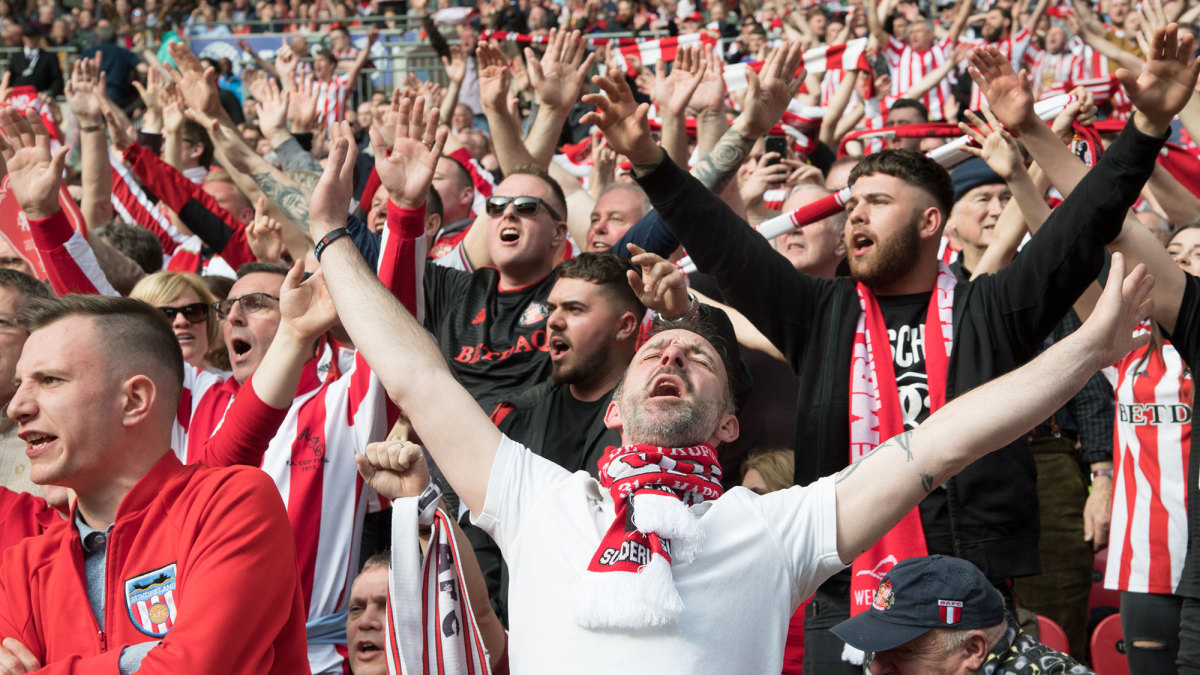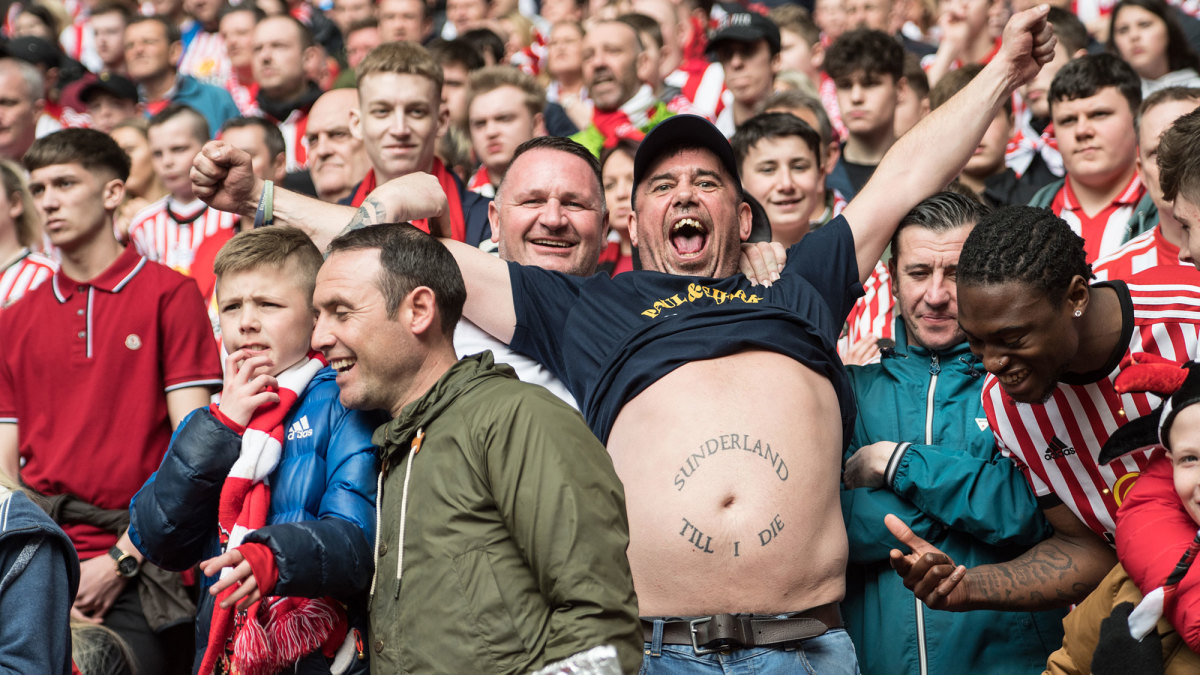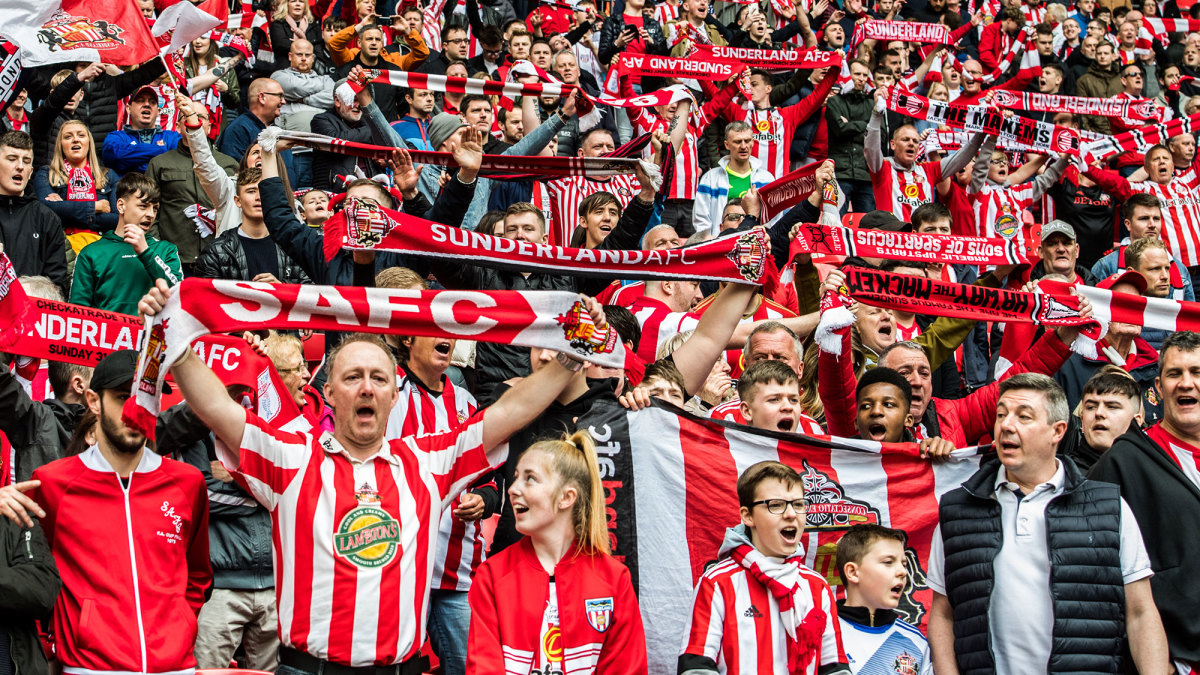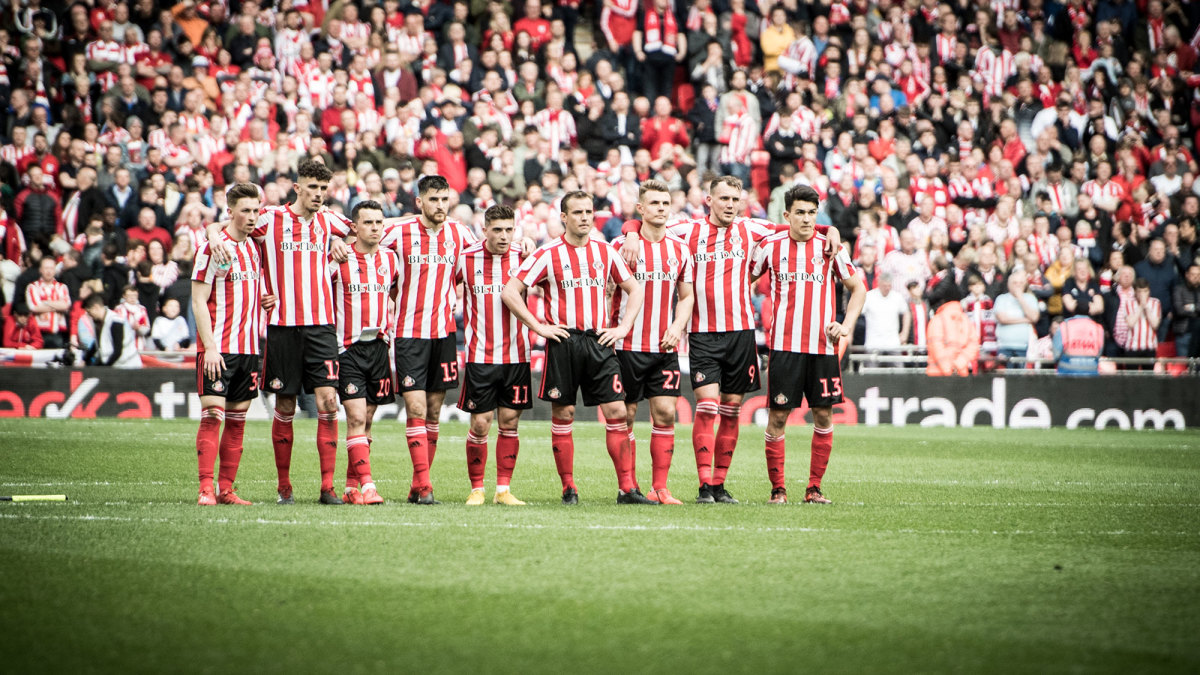'Sunderland 'Til I Die' Returns for Second Season With Fresh Approach on Club's Turbulent Times
There’s a scene in the first episode of the second season of Sunderland ‘Til I Die where members of the first team join forces with the stadium’s maintenance crew to put seats together in the North Stand ahead of the 2018-2019 season. The club’s cameras and social team chronicle the event as players chat with construction workers and smile alongside season-ticket holders inside the Stadium of Light.
“The fans have enjoyed this, 'cause it’s their ground, and when they come here it’ll give them real pride in the place,” new club owner and chairman Stewart Donald says.
To the skeptic, this scene might appear as nothing more than a publicity stunt as the new owners look for anything positive ahead of life in a lower league; Sunderland has been relegated once again (from the Championship to League One) and this club needs all the good PR it can get. But if the audience pays closer attention, it might be able to take something else from it.
As society grapples with a global pandemic that has not only halted football but daily life as we know it, this scene (and the series as a whole) is a reminder of how beautiful sports can be and how much we yearn to be part of a community.
And that’s what Sunderland ‘Til I Die ultimately gives us.
Picking up from the first season, the latest six-part installment from Netflix that premieres on April 1 (produced by local company Fulwell73, which is made up of lifelong Sunderland fans, including executive producer Leo Pearlman) once again highlights the cultural bond between the club and the city’s loyal working-class supporters.
It’s a portrait of a town, its club and the everlasting meaning of the beautiful game in a forgotten city in the north east of England. But the key difference, at least narratively, is that unlike the first season, the second places the fan as less the protagonist and more the heartfelt soundtrack. This is no longer just a story where Sunderland fans are romanticized, but rather one that shows the cruel reality of where their club stands. The series tells of turbulent times for Sunderland after back-to-back relegations. The club finds itself in the third tier of English football with the most expensive squad in the league (7-8 million pounds higher than its nearest rival), a 35 million-pound deficit and key players with expiring contracts, mostly influenced by agents who have an eye for bigger salaries.

After finishing the first season, Pearlman and his team didn’t plan to do a second, but given that the club’s new ownership offered a sign of hope, Pearlman saw an opportunity to refocus the story, especially since the new owners also offered more transparency.
“In the first season, we didn’t have any of the inner workings of the club, but the new owners were willing to offer as much transparency and honesty to us and the cameras and that gave us a reason to do a second season,” Pearlman told Sports Illustrated. “It then became obvious that the owners would become the focus.”
As a result, the season gives us two main characters: Donald and Charlie Methven, a southern, Eton-educated former journalist and PR executive with a 6% stake in the club.
“They are fascinating characters and effectively the same on and off camera, that’s what makes them so brilliant” Pearlman said. “I don’t think either of them know how to be anything other than themselves, which (for a filmmaker) is great.”
Both are different in personality (Donald is more emotionally driven whereas Methven strives for perfectionism a la Gordon Gekko) but similar in execution, and as the season develops we see them fight in almost-impossible situations–sometimes as a result of their own doing–as Sunderland battles for a top-two finish in order to gain automatic promotion and a return to the Championship.
If season one was a poem, then this one is a battle-cry.
“Taking over Sunderland was the ultimate business challenge,” Methven said. “We were going to a club that was simply destroyed, and the main challenge was, ‘How do we get it back to its feet but also make it a competitive club?’ And that was our dream–to make it a stable business and a competitive club.”
Pearlman was allowed exclusive, behind-the-scenes access, which permits the audience to see almost everything the club endured during this period.
“Once you allow proper access, you have to be extremely disciplined. They followed us everywhere and that was the best possible way to offer a transparent story,” Methven said. “Both Stewart and I are extroverts, but we had to ignore them and let them follow us, just appear oblivious and that’s when you get the honesty [in the series].”
Not everything was filmed of course. These were extremely difficult times for the club’s staff, and as a result, over 100 people were let go in this period, so it would have been unfair and insensitive to film those moments. But almost everything else was given the green light as Methven, Donald and their team looked to succeed.
“I think the tragedy in the series is just how close we came to succeeding in breathing life back to the club and becoming competitive,” said Methven, who left his post as director for personal reasons but remains a shareholder. The pressure to deliver, Methven states, took its toll on his family.
“Running the day-to-day was a phenomenal experience. But in the previous 18 months I wasn’t a good husband, I wasn’t a good employer,” he said. “Everyone in my life had to take a back seat during this time, and despite the fact that they were extremely understanding, it was difficult. But now, I am able to pay more attention to other aspects of my life. It’s been nice to take some sanity back to my life and be a better husband and father.”
**********

Something quite unique to the show’s direction–and why it differentiates itself from other soccer productions–is how the story’s pace can seamlessly shift between calm and erratic. There are poignant, calm moments such as the beginning of the third episode, which begins on Remembrance Day and where family man, Sunderland fan and veteran Andrew Cammiss proudly talks with his wife about the sacrifices his family has made as part of the armed forces.
That is followed by the exhilarating, nerve-wracking fourth episode titled Poker Day. It’s the end of January’s transfer window, Josh Maja, the club’s leading scorer, has left the club to Bordeaux and Donald has little time to find a replacement. Wigan’s Will Grigg (inspiration for the famous Euro 2016 viral fan chant) is the main target, but the clock is ticking, and Donald knows he will have to overpay in order to get his man. The episode embodies Jerry Maguire’s frantic scene when he competes against rival agent Bob Sugar to keep clients. The only difference is that this is real life. Sunderland ends up getting Grigg, but for a hefty fee of about $3.7 million, making him the most expensive transfer in league one history.
Because football in the United Kingdom is so entwined in the thread of British society, it’s impossible to take social and political issues out of this story. And so the fifth episode begins with Brexit and Sunderland’s own perception of the development. The uncertainty of both promotion to the Championship and the city’s own economic and political outcome become a central aspect of the story.
At times you feel like being a Sunderland fan is like climbing Everest, where minute after minute you’re faced with an avalanche of disappointment. This season deals with two trips to Wembley for a final: the EFL Trophy (a knockout competition for League One and League Two sides) and the dramatic playoff final against Charlton Athletic, which mirrored the 1998 playoff game where both teams fought for promotion the Premier League. All of them ended in heartbreaking Sunderland losses.
“Why is it never us?” says a fan at the final whistle.
Why, indeed.
**********

Many old faces from the first season return for the second, including lifelong Sunderland fan and charismatic taxi driver Peter Farrer and Lynne Willis, who watches every game as if it’s her last. It’s because of them and the constant attention to the community that this show thrives.
The players’ point of view are also key, and many do a great job at exposing the vulnerabilities of an athlete during a turbulent season. There's humble defender/midfielder Luke O'Nien–who has the presence of a schoolboy but the heart of a soldier–who arrives from Wycombe Wanderers and becomes an immediate favorite, creating an immediate bond with fans.
In the series, Donald also emerges as a sympathetic and genuine owner, someone who appears to care for the club beyond financial success.
“Nothing I’ve ever seen can compare to Sunderland," he says in the first episode. "The passion of the fans. They’re mad, absolutely football mad they are, and in lots of ways that doesn’t make me suited to owning them, because I get quite emotionally attached to things and to people, which means that I feel that emotion, and in lots of ways that’s probably not good for me.
It’s worth pointing out that at this point, the club is in much better state than in previous years and Donald is currently searching for a buyer.
**********

In the end, Sunderland ‘Til I Die is not just about the club’s journey as it fights for survival, but it’s also a love letter to the world of lower-league football and how, through its working-class supporters, players and staff, it embodies the meaning of grit, passion and fading hope.
It’s a message that’s sorely needed throughout the community as lower tiers feel the wrath of the current COVID-19 pandemic. Wage deferrals, cost reductions and layoffs are all just part of a reality that’s currently affecting clubs throughout the country, so this docuseries reminds us why a club’s success is about so much more than just promotion. It’s also about the love of the game.
“I honestly believe there is an incredible message to take away from this show given the current circumstances we all find ourselves,” Pearlman said. “Sport is about community, sport is about togetherness, it’s about collectively sharing something. That moment in London at the Checkatrade (EFL) Trophy final with thousands of Sunderland supporters in Trafalgar Square. I wouldn’t change that for anything in the world. I get goosebumps just thinking about it and wondering in all honesty when am I going to get back that kind of moment ever again. And what we have through this show is a true test of togetherness through the thin–there is no tick with Sunderland, it’s just thin. And that’s the message: that no matter what happens, we will come back.”
That’s the heart of football: A raw, imperfect heart that pulsates with passion and fury. It’s why the show works, because it cares for this heart better than most productions. And it’s why the title’s last three words, 'Til I Die, mean so much to so many–because only death can stop a supporter’s heart from beating.
